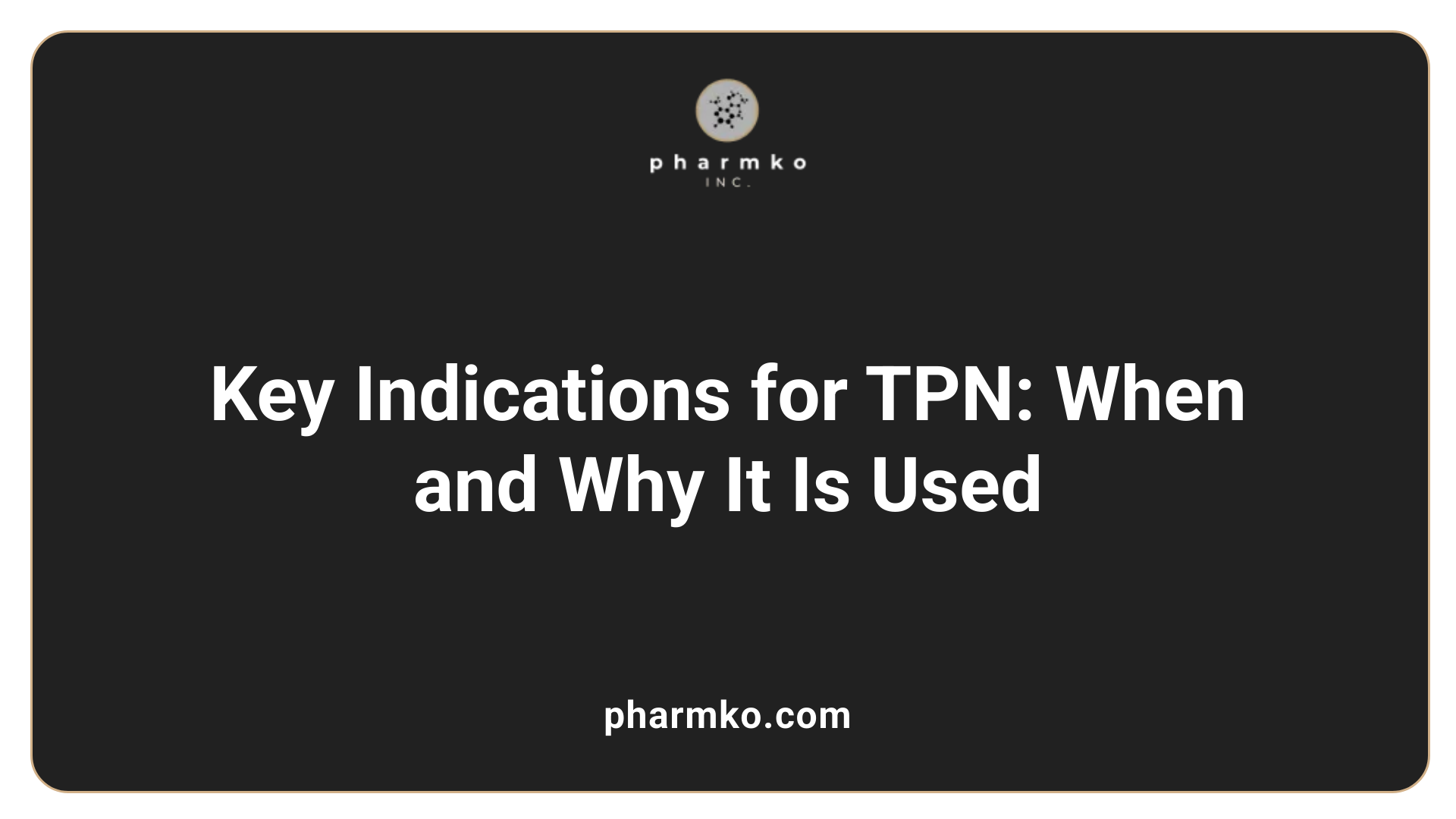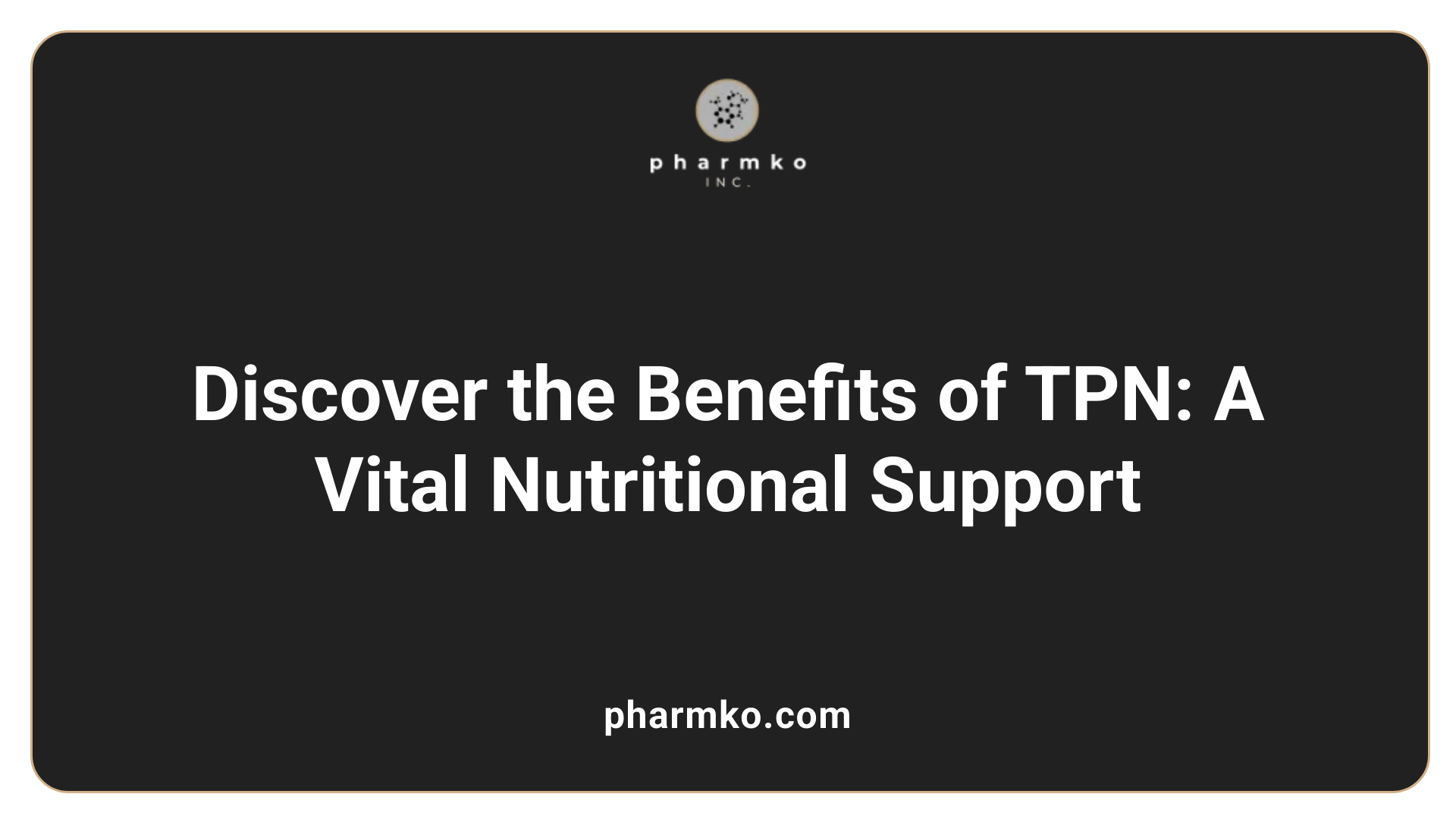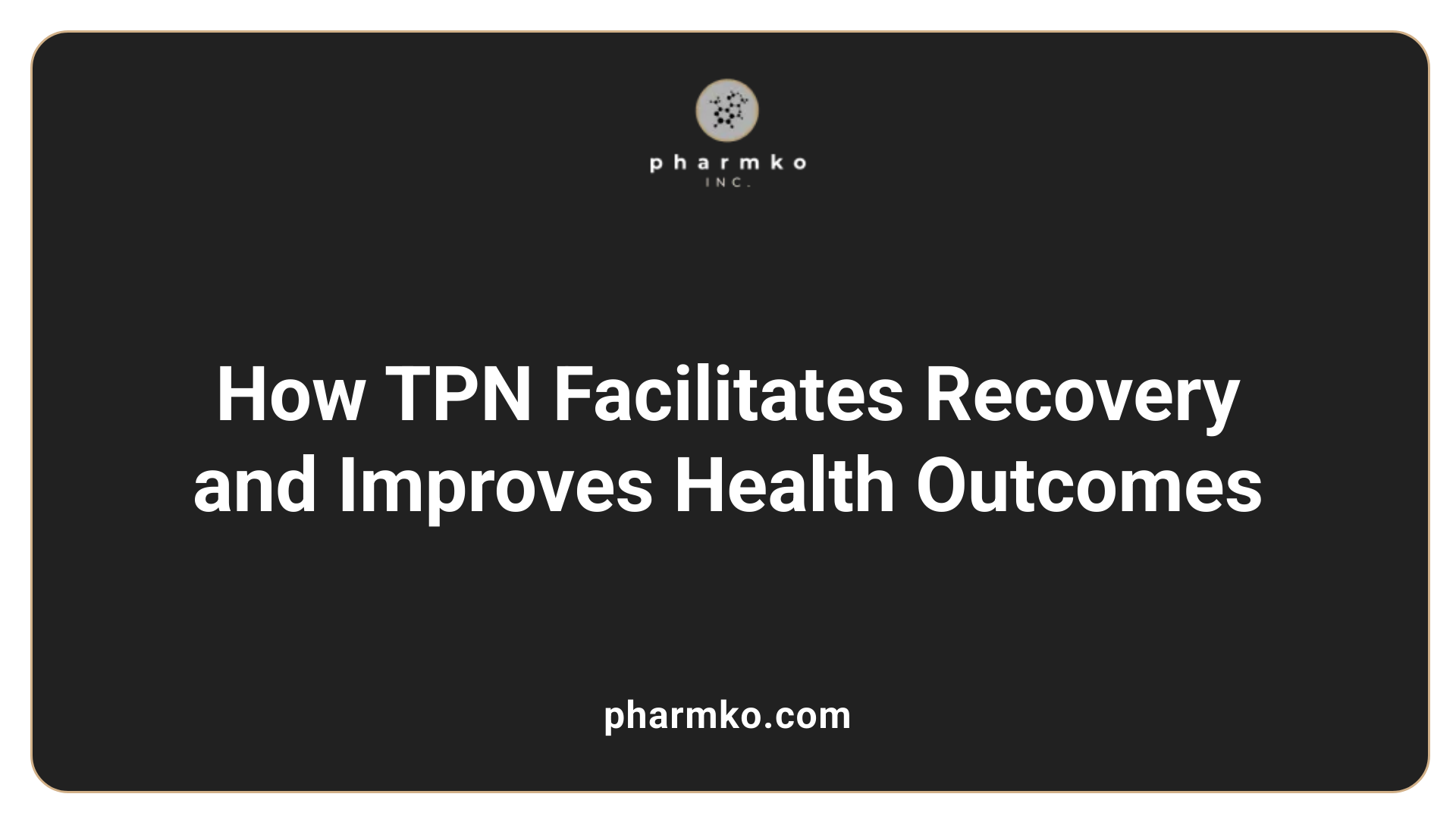Total parenteral nutrition benefits
Understanding Total Parenteral Nutrition (TPN) and Its Impact on Patient Recovery
Total parenteral nutrition (TPN) is a life-saving medical intervention designed for patients with impaired gastrointestinal function. This intravenous method delivers essential nutrients directly into the bloodstream, bypassing the digestive system entirely. Its primary aim is to prevent malnutrition, support tissue repair, and promote overall recovery in a variety of clinical scenarios where oral or enteral feeding is not feasible. This article explores the benefits, mechanisms, clinical applications, and management considerations of TPN, highlighting its vital role in contemporary healthcare.
Why Might a Patient Need TPN for Nutrition?

Conditions impairing digestion or absorption (e.g., bowel obstruction, fistulas, malabsorption)
Patients with severe gastrointestinal disorders often cannot absorb nutrients properly or may have conditions like bowel obstruction, fistulas with high flow, or malabsorption syndromes. These issues make it impossible for the digestive system to process food normally, compelling healthcare providers to turn to TPN. By delivering essential nutrients directly into the bloodstream, TPN maintains nutritional status and supports recovery.
Temporary or long-term dependency on intravenous nutrition
Some patients require TPN temporarily, such as during post-operative bowel rest, or longer-term, such as in cases of short bowel syndrome or permanent gastrointestinal failure. Short-term use prevents malnutrition during immediate recovery, while long-term TPN can be life-sustaining for those with chronic conditions due to intestinal damage or congenital abnormalities.
The importance of avoiding malnutrition and supporting recovery
Malnutrition can hinder healing, weaken the immune system, and prolong hospitalization. TPN is critical in preventing deficiencies in calories, proteins, fats, vitamins, and minerals. It provides a tailored nutrient mixture to meet individual needs, helping patients recover faster, maintain energy levels, and improve quality of life when oral intake isn’t feasible.
| Condition | Description | When TPN is Used |
|---|---|---|
| Bowel obstruction | Blockage preventing food passage | To bypass digestive failure |
| Fistulas with high flow | Abnormal connections causing nutrient loss | To provide nutrition directly to bloodstream |
| Short bowel syndrome | Reduced intestine length impairing absorption | Long-term nutritional support |
| Severe Crohn's disease | Inflammation impairing nutrient absorption | Support during disease flares |
| Post-surgical bowel leak | Leakage after bowel surgery | To ensure nutritional intake when GI is compromised |
| Malabsorption syndromes | Conditions impairing nutrient uptake | To prevent nutrient deficiencies |
Additional considerations
TPN involves a specialized mixture of lipids, dextrose, amino acids, vitamins, electrolytes, and minerals, carefully balanced for each patient. Administration requires trained medical oversight to minimize infection risk, manage metabolic imbalances, and monitor organ function. Patients or caregivers need education on catheter care and infection prevention, especially when TPN is administered at home.
Advantages of TPN Over Other Nutritional Methods

What are the advantages of TPN over other nutritional methods?
Total parenteral nutrition (TPN) provides a comprehensive and customized way to supply nutrients directly into the bloodstream. This approach is especially beneficial for patients with severe gastrointestinal (GI) issues that prevent normal digestion and absorption, such as bowel obstruction, fistulas, or malabsorption syndromes.
Unlike enteral nutrition or tube feeding, TPN bypasses the GI tract entirely. This ensures that patients who cannot tolerate oral intake or have a non-functional digestive system still receive all necessary nutrients to support their recovery and maintain their health.
One of the major benefits of TPN is its capability for precise nutrient control. Healthcare providers can tailor the mixture of carbohydrates, proteins, fats, vitamins, and minerals according to the patient’s specific metabolic needs. This personalized approach helps optimize recovery and manage deficiencies effectively.
In critical medical situations, TPN is often the only viable option. For example, patients with bowel obstructions, high-output fistulas, or major surgeries affecting the GI tract may need TPN to prevent malnutrition, support immune function, and promote healing.
While TPN offers these crucial advantages, it also demands careful oversight. Its usage involves risks like infections from central lines, metabolic changes, and organ complications. Nonetheless, when used appropriately, TPN is an invaluable nutritional method that can be life-saving and improve quality of life for patients unable to use their gastrointestinal system effectively.
Supporting Recovery and Enhancing Health Outcomes

How does TPN support patient recovery and health outcomes?
Total parenteral nutrition (TPN) plays a vital role in patient recovery by providing all essential nutrients directly into the bloodstream when the gastrointestinal (GI) tract is unable to perform its digestion and absorption functions. This is especially crucial for patients with conditions such as short bowel syndrome, bowel obstruction, or fistulas, where normal eating is not feasible.
By delivering a carefully balanced mixture of carbohydrates, proteins, fats, vitamins, minerals, and electrolytes, TPN helps prevent malnutrition and supports tissue repair. It is particularly beneficial in critical illness, post-surgical recovery, or in complex gastrointestinal disorders where maintaining nutritional status directly influences healing and immune function.
TPN can be administered temporarily during acute phases or long-term for chronic conditions. It is delivered via central venous catheters, such as tunneled lines or PICC lines, ensuring a continuous, controlled supply of nutrients. Through meticulous monitoring by healthcare teams—including regular blood tests and adjustment of nutrient formulas—TPN minimizes risks like infections, metabolic imbalances, and organ damage.
Overall, TPN facilitates recovery by ensuring patients sustain proper nutrition, accelerate wound healing, and bolster immunity. Its targeted approach in maintaining hydration and energy levels significantly improves health outcomes, especially in critical care and complex GI conditions, supporting better prognosis and quality of life.
Components of TPN and Their Health Benefits
Total parenteral nutrition (TPN) is a carefully balanced mixture of nutrients designed to meet the specific needs of patients who cannot eat or absorb food normally. It includes several essential components: carbohydrates (mainly dextrose), lipids (intravenous fat emulsions), amino acids (protein building blocks), vitamins, minerals, trace elements, electrolytes, and water.
Each of these elements plays a vital role. Carbohydrates, primarily in the form of dextrose, serve as the main energy source, supporting cellular functions and overall vitality. Lipids provide essential fatty acids and concentrated calories, which help prevent deficiencies and supply the energy needed for tissue repair and immune functions.
Amino acids are crucial for tissue growth, wound healing, and immune responses, making them indispensable in recovery and maintenance of muscle mass. Vitamins and minerals support various cellular processes, antioxidant defenses, and metabolic reactions, ensuring the body functions optimally.
The precise formulation of TPN, coupled with routine monitoring, ensures that the patient maintains metabolic stability. Healthcare providers regularly check blood glucose, electrolyte levels, liver function, and other parameters to adjust the mixture accordingly. This careful management helps prevent complications, such as nutrient imbalances or deficiencies, and promotes recovery, especially in patients unable to take nutrients through the gastrointestinal tract.
Clinical Indications and Applications of TPN
Total parenteral nutrition (TPN) is a critical therapy used in various medical situations where the gastrointestinal (GI) tract cannot be used for nutrition. Its applications include managing severe gastrointestinal obstructions, fistulas, and malignancies that impair oral or enteral feeding.
Patients with bowel pseudo-obstruction, GI fistulas with high output, or those experiencing malabsorption due to conditions like Crohn's disease or short bowel syndrome are common candidates for TPN. Post-operative cases, especially after bowel surgeries, bowel leaks, or in cases of severe trauma, also often require TPN to ensure adequate nutrition during recovery.
In addition, TPN supports individuals with burn injuries or trauma, who experience hypercatabolic states—conditions where the body rapidly breaks down nutrients.
In critical care settings, such as in the ICU, TPN is used when patients cannot tolerate feeding through the GI tract for more than a week. It provides a precise mixture of nutrients, including amino acids, lipids, carbohydrates, vitamins, minerals, and electrolytes tailored to individual needs.
By bypassing the GI system, TPN helps prevent malnutrition, supports wound healing, and maintains energy balance. Its use is essential in cases where the GI tract is inaccessible or nonfunctional, ensuring the patient’s nutritional requirements are met and aiding in overall recovery.
| Condition or Situation | Indication for TPN | Additional Notes |
|---|---|---|
| Bowel obstruction, fistula, or malabsorption | Severe GI dysfunction | When oral/enteral feeding is impossible |
| Post-operative bowel leak | Surgical complication | Requires nutritional support during healing |
| Critical illness (ICU) | Hypercatabolic state | For patients unable to tolerate GI feeding |
| Burn, trauma, severe infection | Increased metabolic demand | Supports tissue repair and recovery |
| Short bowel syndrome | Reduced absorption capacity | Maintains nutrition when bowel length is insufficient |
| Malignancies affecting GI tract | Tumor obstruction or resection | To prevent weight loss and nutrient deficiencies |
Overall, TPN is an indispensable nutritional intervention that ensures patients receive necessary nutrients when their digestive system cannot provide them, ultimately supporting health and healing.
The Essential Role of TPN in Modern Medicine
Total parenteral nutrition (TPN) stands as a cornerstone in critical care and complex medical management, offering life-sustaining nutrition for patients unable to use their gastrointestinal system effectively. Its ability to provide complete, tailored nutrition directly into the bloodstream helps prevent malnutrition, supports immune function, and facilitates tissue repair—ultimately enhancing recovery outcomes. While it requires careful monitoring to mitigate risks, advancements in formulation and delivery have made TPN a safe and invaluable tool. As medical technology and multidisciplinary care continue to evolve, TPN’s significance in improving health, saving lives, and maintaining quality of life remains undeniable, affirming its vital position in modern healthcare.
References
- Total Parenteral Nutrition - StatPearls - NCBI Bookshelf
- Home parenteral nutrition - Mayo Clinic
- Understanding the Benefits of Total Parenteral Nutrition - AvevoRX
- Total Parenteral Nutrition (TPN) | Aurora Health Care
- Conditions Treated - Total Parenteral Nutrition | Stanford Health Care
- Parenteral Nutrition: What it Is, Types, and More - Healthline
- Understanding Total Parenteral Nutrition for Optimal Health













